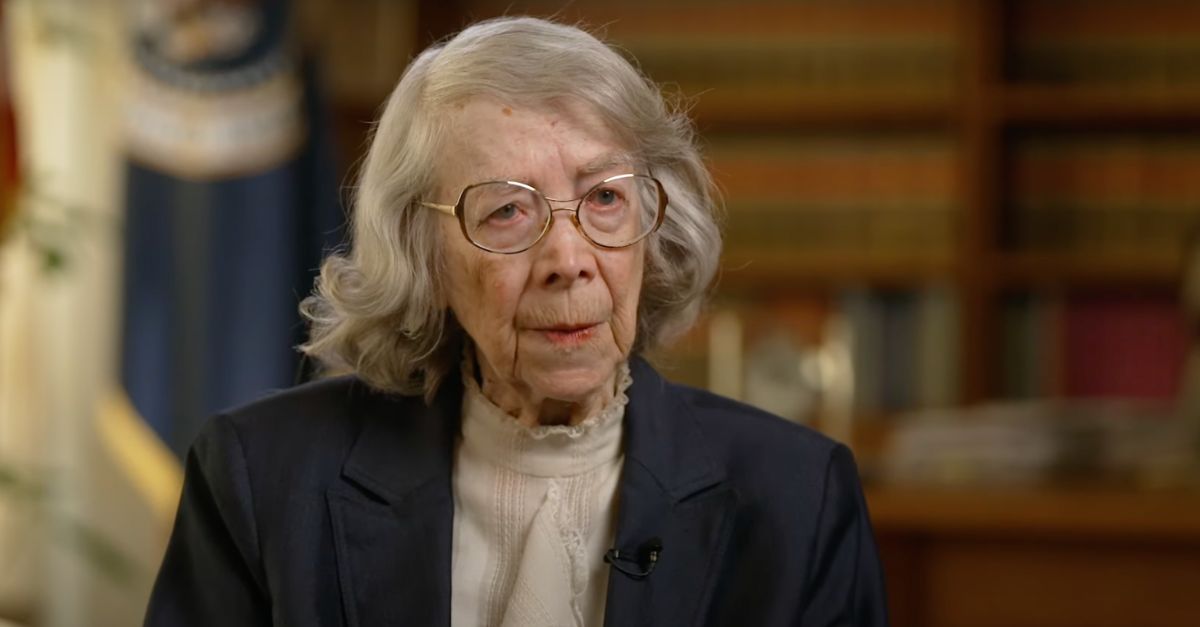
U.S. Circuit Judge Pauline Newman was suspended from hearing cases after the Judicial Council of the Federal Circuit unanimously found that the judge’s refusal to submit to a mental examination was improper. (Screengrab via YouTube).
U.S. Circuit Judge Pauline Newman, at 96 years old the nation’s oldest federal judge, was suspended by the the appellate court on which she has served for nearly four decades for failing to cooperate with an investigation into her mental capacity.
The Judicial Council of the U.S. Court of Appeals for Federal Circuit issued a unanimous and extensive 76-page order Wednesday barring Newman from hearing new cases for at least one year or until she submits to court-ordered medical examinations. The voluminous order detailed many examples of Newman’s questionable behavior in recent years, ranging from episodes of confusion and forgetfulness to more aggressive, paranoid, and belligerent behaviors.
Chief Judge of the Federal Circuit Kimberly A. Moore chaired the committee of Newman’s fellow judges. Newman sued the committee in May and asked a federal district court to block all proceedings against her as illegal. In Newman’s lawsuit, the judge argues that since her appointment in 1984, she has “faithfully, diligently, and meticulously exercise the duties of her office, to recognition and acclaim,” and has been “in sound physical and mental health” the entire time.
In its suspension order Wednesday, the council acknowledged in its order that Newman “has served with distinction” as a “a highly valued and respected colleague” for 39 years. Newman’s own colleagues from the bench said that despite the nonagenarian’s being touted as “the heroine of the patent system” and “the most beloved colleague on our court,” recent evidence “raised increasing doubts about whether Judge Newman is still fit to perform the duties of her office.”
The council called its investigation and suspension of Newman “sad proceedings for all involved,” but said that inaction would be a breach of the court’s responsibility to protect litigants’ rights as well as “the rights of court staff to be free from increasingly dysfunctional behavior in the workplace.” The council also said it tried repeatedly to handle the matter discretely with Newman, but that the judge “left no other option,” save a formal proceeding against her.
Investigators conducted over 20 interviews with court staff and reviewed numerous emails which “provided overwhelming evidence” of “mental problems including memory loss, lack of comprehension, confusion, and an inability to perform basic tasks that she previously was able to perform with ease.” Further, Newman was found to be “frustrated, agitated, belligerent, and hostile towards court staff.”
The order continued, providing specific details of staff reports that increased in both frequency and severity over the past two years:
With no rational reason—other than frustration over her own confusion—Judge Newman has threatened to have staff arrested, forcibly removed from the building, and fired. She accused staff of trickery, deceit, acting as her adversary, stealing her computer, stealing her files, and depriving her of secretarial support. Staff have described Judge Newman in their interactions with her as “aggressive, angry, combative, and intimidating”; “bizarre and unnecessarily hostile”; making “personal accusations”; “agitated, belligerent, and demonstratively angry”; and “ranting, rambling, and paranoid.” Indeed, interactions with Judge Newman have become so dysfunctional that the Clerk of the Court has advised staff to avoid interacting with her in person or, when they must, to bring a co-worker with them.
What’s more, found the council, Newman’s troublesome behavior spanned a broad range of departments and an extended period of time. All the while, Newman was working with a much-reduced workload and “has taken four times as long to issue half the number of opinions as her colleagues.”
More from Law&Crime: Judge called out for angrily invoking her office while dubbing double-parked public school teacher a ‘stupid b—-‘
Following the investigation’s conclusion, the court directed Newman on May 16, 2023 to undergo two medical examinations: one 30-45-minute interview with a neurologist, with no required invasive procedures, and a full neuro-psychological examination that would involve approximately six hours of cognitive testing.
Read Related Also: Co-op boss reveals stores hire ex-cops amid shoplifting 'epidemic'
Newman refused, but offered two reports of her own medical testing. In one, she provided results of a 10-minute assessment in which Newman’s score was both “below the normal range,” and somewhat suspect. According to the council, the results “showed inconsistencies between Judge Newman’s reported score and the stated fact that she was unable to write (due to a broken wrist), which would have prevented her from completing three parts of the test.” The second test was an 11-minute cognitive exam that measured whether Newman “[could] point to her chin, knows the year, and can name a few four-legged animals.”
The council said that Newman’s testing “does not remotely provide good cause for Judge Newman refusing to take the full neuropsychological examination (six hours) requested by the Committee.”
Further, the lengthy order included numerous anecdotes indicating Newman suffered from memory loss. In one, Newman told an assistant that she was not required to comply with a court rule, “because Chief Judge Markey told her she could take 30 days to vote.”
“Chief Judge Markey has been dead for 17 years and has not been a member of the Court for 32 years,” noted the council.
Newman is represented by New Civil Liberties Alliance (NCLA), a public-interest law firm that focuses on the “administrative state.” In a statement Wednesday, the group derided its client’s suspension as an “illegal” and “damaging blow to judicial independence.”
NCLA took particular issue with the order that Newman was “submit to forced neurological testing by a medical professional whom she was denied any role in selecting,” and called the requirement “unprecedented in American judicial history and inconsistent with the Disability Act.” In its statement, NCLA included a link to a recent video of Newman, which can be viewed here.
“Forcing a federal judge to submit to a forced medical examination to remain on the bench is not consistent with the Constitution, which requires impeachment for removal from judicial office,” the NCLA statement said.
Newman’s attorney Greg Dolin vowed that his client would continue to “fight for due process of law and respect for constitutional norms.” Dolin slammed the council for engaging in “sharp practices” and for unfairly accusing Newman and NCLA for “trying their case in the press.”
Newman was appointed by President Ronald Reagan to the Federal Circuit in 1984. She was the first judge to be appointed directly to the Federal Circuit.
The Department of Justice declined to comment on Newman’s suspension or on the related pending case.
Have a tip we should know? [email protected]








